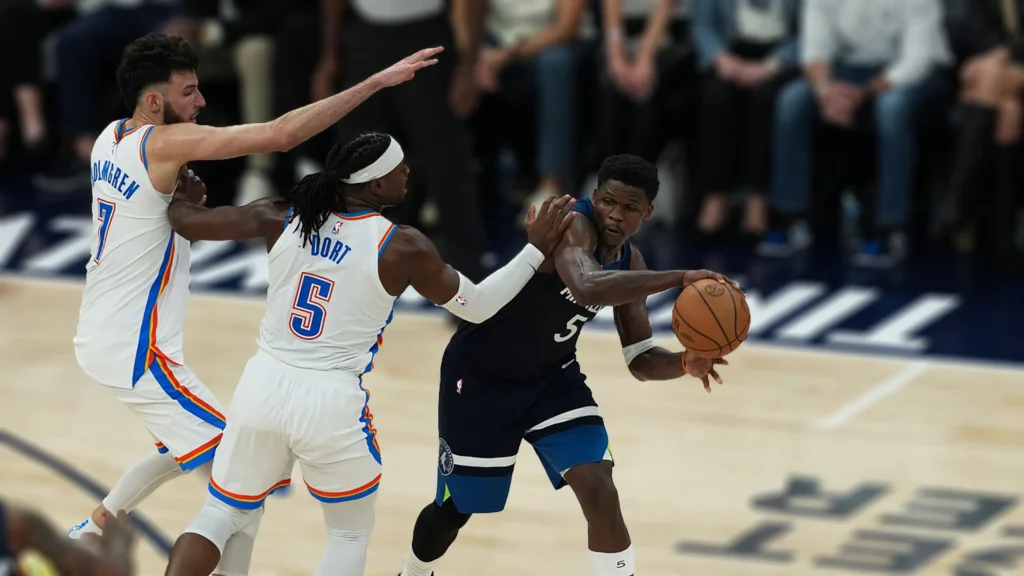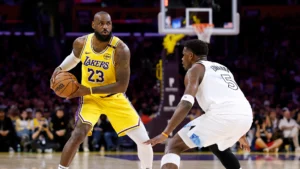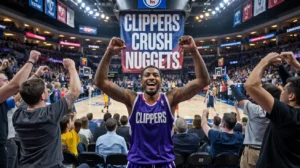
Minneapolis, Minnesota- As the Minnesota Timberwolves fell to the Oklahoma City Thunder 128–126 in Game 4 of the 2025 Western Conference Finals, the spotlight immediately turned to franchise cornerstone Anthony Edwards. While the box score reflected a modest 16-point performance from the 22-year-old guard, Edwards brushed off the notion that he struggled, telling reporters postgame, “I don’t think I struggled.” This statement has sparked debate across the basketball community, with many questioning whether confidence or defiance fueled his postgame remarks.
Anthony Edwards Game 4 vs Thunder was far from his usual high-octane scoring showcases. Averaging 27.3 points per game during the playoffs entering Game 4, expectations were towering for Edwards, who had consistently carried the Timberwolves on both ends of the floor. Yet against the Thunder, Edwards faced double teams, aggressive closeouts, and a stifling defensive strategy led by Luguentz Dort and Chet Holmgren. Despite these challenges, Edwards contributed in other ways, finishing with 9 assists and 7 rebounds, nearly posting a triple-double.
Still, for a Timberwolves squad fighting to even the series at home, Edwards’ limited scoring output stood out. In contrast, Minnesota’s bench delivered an unexpected offensive surge. Nickeil Alexander-Walker exploded for 23 points, while Jaden McDaniels and Donte DiVincenzo added 22 and 21 points, respectively. Karl-Anthony Towns also chipped in 19 points. The depth scoring kept the Timberwolves within striking distance all night, but it wasn’t enough to overcome a late surge from Oklahoma City.
What made the Thunder so effective defensively against Edwards was their ability to rotate swiftly and recover in transition. Head coach Mark Daigneault’s game plan was clearly designed to frustrate Minnesota’s primary scorer by forcing him to facilitate rather than attack. This approach led to Edward’s efficient playmaking but also minimized his scoring dominance. His 16 points came on just 5-of-17 shooting from the field, and he failed to connect from deep, going 0-of-3 from beyond the arc.
Following the game, when asked about his performance, Anthony Edwards delivered a response that reflected confidence rather than concern. “I don’t think I struggled,” he reiterated. “I was getting my teammates involved, doing what the game needed.” This kind of mindset underscores Edwards’ growing maturity as a team leader. While some might interpret his statement as dismissive of a statistically off night, others see it as a sign of evolving leadership—where value is measured by overall impact, not just points on the scoreboard.
Still, in a high-stakes Western Conference Finals, the Timberwolves needed Edwards to deliver at his usual elite level. Falling behind 3–1 in the series places Minnesota on the brink of elimination, with Game 5 heading back to Oklahoma City. The Thunder, led by MVP finalist Shai Gilgeous-Alexander and supported by Holmgren’s two-way prowess, now have full control of the series. Their defense has successfully muted Minnesota’s top weapons at crucial moments, and the pressure is mounting for Edwards to bounce back with a signature performance.
The conversation surrounding Anthony Edwards Game 4 vs Thunder goes beyond just numbers. It touches on leadership, expectations, and the evolution of a young superstar learning how to handle playoff adversity. While the Timberwolves have proven depth and resilience, their hopes of advancing depend heavily on Edwards rediscovering his scoring rhythm and closing out games with authority.
As Game 5 looms, all eyes will be on Anthony Edwards—not just to see how many points he scores, but to gauge how he responds to the adversity that now defines the Timberwolves’ postseason journey. Whether or not his Game 4 performance qualifies as a struggle is now a matter of opinion, but what’s certain is that Minnesota needs their star to shine brighter than ever with the season on the line.
Watch Anthony Edwards Post Game Interview:

